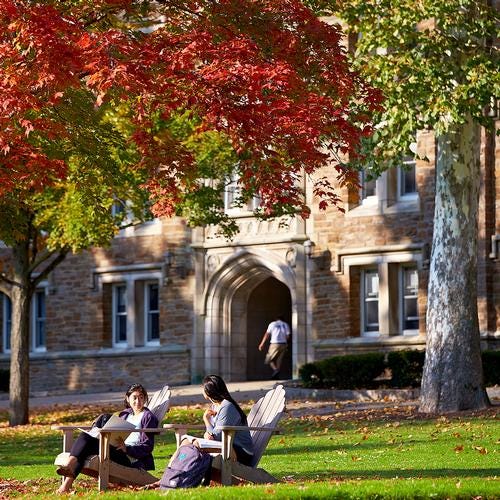
Upon entering Professor Hysell’s office, Director of the English for Speakers of Other Languages (ESOL) Program, tucked in the corner of the second floor of Kirner Johnson, one notices several things. For one, the tiny space is decked with a plethora of artifacts hailing from almost every corner of the globe, covering table tops and bookshelves in a dazzling melange of cultures.
For another, a compilation of protest signs litter the area behind the big wooden desk, asking people to “Stand up to Racism!” and informing them that “Women Rights are Human Rights.” Most importantly, students entering the office are met with a warm smile coming from the venerable figure sitting behind the desk: that of Professor Hysell, director of the ESOL program and de facto guardian of international students at Hamilton.
I first became familiar with the ESOL program through a presentation Ms.Hysell hosted during my first-year orientation. The program was one of the few that specifically focused on foreign students by helping them acclimate to Hamilton and the U.S. at large. The program not only worked to bridge the gap between the domestic and international students when it come to academic writing, but to also give international students contextual understanding of the different facets of social life in the U.S., specifically through Ms. Hysell’s class on social movements.
As a foreign-born student myself, the ESOL department was an invaluable resource to me and other internationals during my first year. This is why it was with dismay that I saw one of our social spaces, formerly located in the basement of Buttrick Hall, be closed down by the school. The loss of this social space dealt a blow to the already under-funded program that Ms. Hysell worked tirelessly to build.
The ESOL program serves a much bigger role than just preparing students academically. It doubles as a support system for students who are thousands of kilometers away from their homes, and who may not feel comfortable enough utilizing traditional resources. The corresponding school response should then be an increased level of administrative support. It goes without saying that international students face challenges that domestic students do not, and ESOL cannot effectively tackle these challenges while lacking the requisite levels of assistance.
I sincerely believe that, given more space and resources, the ESOL program would be a huge net positive to the international students — and the student body as a whole — at Hamilton. I will end this article with a great tip: if you can finagle yourself an invite to one of Ms. Hysell’s legendary dinners, then you can graduate knowing your Hamilton experience is complete.
‘From Where I Sit’ is a column dedicated to international students’ voices. If you are interested in contributing a piece, contact Features editors at [email protected]

















